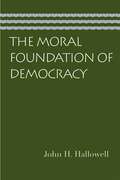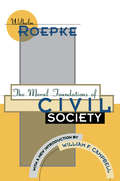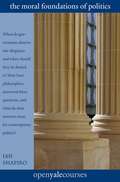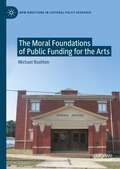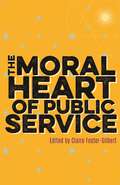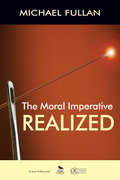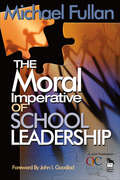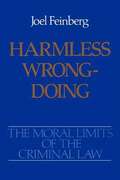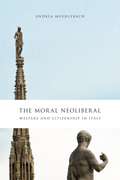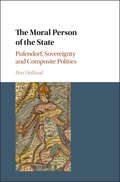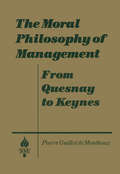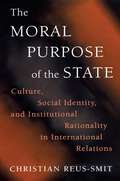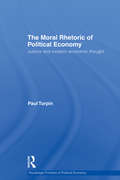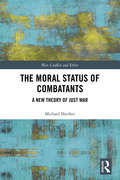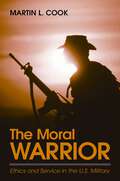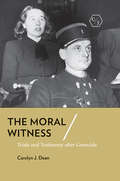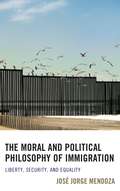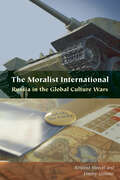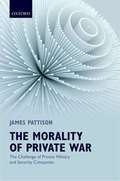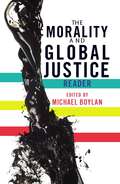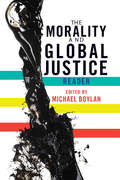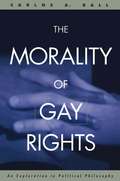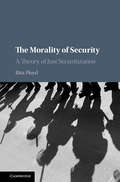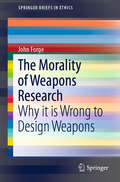- Table View
- List View
The Moral Foundation of Democracy
by John H. HallowellWith The Moral Foundation of Democracy, John H. Hallowell makes a significant argument in favor of the importance of moral values in the orderly functioning of modern democracies. Hallowell argues that developments in recent democratic thought have eroded the very “faith” upon which democracy rests, namely, that man is a reasonable, moral, and spiritual actor. He sharply criticizes positivist thought and moral relativism as direct challenges to the notion that transcendent truths guide individuals in their actions and influence how people participate in a democratic society. John H. Hallowell taught political science for forty years at Duke University and was chair of the department from 1964 to 1971. He died in 1991.
The Moral Foundations of Civil Society
by Wilhelm RoepkeWilhelm Roepke may have been the soundest economist of the twentieth century. He understood the limitations as well as the strengths of his discipline. Economists are often tempted to take the easy way out, by denying reality to aspects of human existence and reducing them to arbitrary and subjective tastes and preferences. Roepke never does this, and this is his strength. He realizes that all of these are legitimate aspects of human experience which must be satisfied in a balanced and harmonious social existence. Nature, sex, religion, beauty, and politics are all meaningful as parts of the whole. Problems occur only when each segment attempts to become the whole.The original title of this book, Civitas Humana, contains a double meaning. It promises a treatment of questions fundamental not only to human society but also to humane society. The volume combines distinct aspects of life. Half of the book is devoted to questions of economic and social life. The other half examines spiritual and national life. Chapters include Moral Foundations, The Place of Science in the City of Man, Counterweights to the State, Congestion and Proletarianisation of Society, and Economic System and International New Order.Although Roepke recognized the validity of the nation in the modern world, he was constantly trying to find the smaller agencies within society in which real allegiances and loyalties were to be developed. His ideas continue to be of significance. As described by William F. Campbell in the new introduction, The Moral Foundations of Civil Society is a necessary addition to the libraries of economists, sociologists, theologians, and philosophers.
The Moral Foundations of Politics
by Ian ShapiroWhen do governments merit our allegiance, and when should they be denied it? Ian Shapiro explores this most enduring of political dilemmas in this innovative and engaging book. <P><P> Building on his highly popular Yale courses, Professor Shapiro evaluates the main contending accounts of the sources of political legitimacy. Starting with theorists of the Enlightenment, he examines the arguments put forward by utilitarians, Marxists, and theorists of the social contract. Next he turns to the anti-Enlightenment tradition that stretches from Edmund Burke to contemporary post-modernists. In the last part of the book Shapiro examines partisans and critics of democracy from Plato's time until our own. He concludes with an assessment of democracy's strengths and limitations as the font of political legitimacy. The book offers a lucid and accessible introduction to urgent ongoing conversations about the sources of political allegiance.
The Moral Foundations of Public Funding for the Arts (New Directions in Cultural Policy Research)
by Michael RushtonThis book provides a detailed account, and critique, of diverse approaches to the arts funding question, with a focus on the arm’s length arts councils that are the norm in the Anglo-American world. It builds on economic methods, the liberal-egalitarian framework of John Rawls, the communitarian opposition to the liberal framework, the capabilities approach to equality, and the cultural conservatism of Roger Scruton and others. In each case, the book considers the very practical aspect of public funding of the arts, namely, what are the implications for what ought to receive priority, and what parts of the cultural world are best left to their own, private sector, devices. It is not a work of “arts advocacy”. Rather, the book challenges assumptions, and sparks critical debate in the field.
The Moral Heart of Public Service
by William Hague Rowan Williams John Hall Andrew Tremlett Claire Foster-Gilbert Mary Mcaleese Peter Hennessy Stephen Lamport The Dean Westminster Vernon WhiteNow more than ever, public servants must consider and reassess how to keep moral courage in public life alive. With ethical expectations and needs changing and government policies under increasing moral scrutiny, Claire Foster-Gilbert of Westminster Abbey Institute gathers a series of essays and lectures by herself and others, exploring the meaning of 'moral code' in today's public service, and how it can be rekindled in practice. Timely and timeless, the book is founded on traditional values of honesty, moral rigour and neighbourliness, and discusses how to champion stability, peace, community and virtue in contemporary public life. The authors, including eminent figures such as the former President of Ireland Mary McAleese, historian Peter Hennessy, former First Secretary of State William Hague and former Archbishop of Canterbury Rowan Williams, explain how realistic compromises can be balanced with clear goal-setting for ideal results. Forward-thinking and authoritative, this book will be a precious resource to anyone seeking to boost the circulation of integrity throughout all aspects of public life.
The Moral Imperative Realized
by Michael FullanAward-winning author and educational reform expert Michael Fullan shows how to achieve successful local and systemic school reform through the strength of shared leadership.
The Moral Imperative of School Leadership
by Michael FullanThe time has come to change the context of school leadership! The role of the principal is pivotal to systemic school change. That is the fundamental message in The Moral Imperative of School Leadership, which extends the discussion begun in Fullan's earlier publication, What’s Worth Fighting for in the Principalship? The author examines the moral purpose of school leadership and its critical role in "changing the context" in which the role is embedded. In this bold step forward, Fullan calls for principals to become agents as well as beneficiaries of the processes of school change. Concepts explored in-depth include: Why "changing the context" should be the main agenda for the principalship Why barriers to the principalship exist Why the principal should be seen as the COO (chief operating officer) of a school Why the role of the principal should figure more prominently within the system
The Moral Limits of the Criminal Law: Harmless Wrongdoing (Volume Four)
by Joel FeinbergThe final volume of Feinberg's four-volume work, The Moral Limits of Criminal Law examines the philosophical basis for the criminalization of so-called "victimless crimes" such as ticket scalping, blackmail, consented-to exploitation of others, commercial fortune telling, and consensual sexual relations.
The Moral Neoliberal: Welfare and Citizenship in Italy
by Andrea MuehlebachMorality is often imagined to be at odds with capitalism and its focus on the bottom line, but in The Moral Neoliberal morality is shown as the opposite: an indispensible tool for capitalist transformation. Set within the shifting landscape of neoliberal welfare reform in the Lombardy region of Italy, Andrea Muehlebach tracks the phenomenal rise of voluntarism in the wake of the state’s withdrawal of social service programs. Using anthropological tools, she shows how socialist volunteers are interpreting their unwaged labor as an expression of social solidarity, with Catholic volunteers thinking of theirs as an expression of charity and love. Such interpretations pave the way for a mass mobilization of an ethical citizenry that is put to work by the state. Visiting several sites across the region, from Milanese high schools to the offices of state social workers to the homes of the needy, Muehlebach mounts a powerful argument that the neoliberal state nurtures selflessness in order to cement some of its most controversial reforms. At the same time, she also shows how the insertion of such an anticapitalist narrative into the heart of neoliberalization can have unintended consequences.
The Moral Person of the State: Pufendorf, Sovereignty and Composite Polities
by Ben HollandThis is the first detailed study in any language of the single most influential theory of the modern state: Samuel von Pufendorf's account of the state as a 'moral person'. Ben Holland reconstructs the theological and political contexts in and for which Pufendorf conceived of the state as being a person. Pufendorf took up an early Christian conception of personality and a medieval conception of freedom in order to fashion a theory of the state appropriate to continental Europe, and which could head off some of the absolutist implications of a rival theory of state personality, that of Hobbes. The book traces the fate of the concept in the hands of others - international lawyers, moral philosophers and revolutionaries - until the early twentieth century. It will be essential reading for historians of political thought and for those interested in the development of key ideas in theology, international law and international relations.
The Moral Philosophy of Management: From Quesnay to Keynes (Studies In Socio-economics)
by Pierre Guillet MonthouxThis book explores the foundation of European management philosophy at a dramatic moment in European history: the Cold War has ended; Western capitalism has triumphed over communism. The book reflects on the role of business and management that has emerged in Western capitalism and it searches for the roots of moral philosophy and the philosophies of management derived from the history of economic thought. It traces such ideas from the late 18th century works, Quesnay and Smith, down through the 19th century to the present. The closing chapter of the book sets out ten principles for tight management in a socio-economic doctrine of ideal enterprise and good management.
The Moral Purpose of the State: Culture, Social Identity, and Institutional Rationality in International Relations (Princeton Studies in International History and Politics #119)
by Christian Reus-SmitThis book seeks to explain why different systems of sovereign states have built different types of fundamental institutions to govern interstate relations. Why, for example, did the ancient Greeks operate a successful system of third-party arbitration, while international society today rests on a combination of international law and multilateral diplomacy? Why did the city-states of Renaissance Italy develop a system of oratorical diplomacy, while the states of absolutist Europe relied on naturalist international law and "old diplomacy"? Conventional explanations of basic institutional practices have difficulty accounting for such variation. Christian Reus-Smit addresses this problem by presenting an alternative, "constructivist" theory of international institutional development, one that emphasizes the relationship between the social identity of the state and the nature and origin of basic institutional practices. Reus-Smit argues that international societies are shaped by deep constitutional structures that are based on prevailing beliefs about the moral purpose of the state, the organizing principle of sovereignty, and the norm of procedural justice. These structures inform the imaginations of institutional architects as they develop and adjust institutional arrangements between states. As he shows with detailed reference to ancient Greece, Renaissance Italy, absolutist Europe, and the modern world, different cultural and historical contexts lead to profoundly different constitutional structures and institutional practices. The first major study of its kind, this book is a significant addition to our theoretical and empirical understanding of international relations, past and present.
The Moral Rhetoric of Political Economy: Justice and Modern Economic Thought (Routledge Frontiers Of Political Economy Ser. #136)
by Paul TurpinTwo of the most important economics treatise are Adam Smith's Theory of Moral Sentiments and Wealth of Nations and Milton Friedman's Capitalism and Freedom. In this book, Paul Turpin provides a rhetorical analysis of these texts arguing that both Smith and Friedman use argumentative and narrative depictions of character to reinforce a sense of societal decorum as a stabilizing foundation for their theories of liberal political economy. The comparison of Smith and Friedman by itself is a major contribution to the development of the history of economic thought. It adds a new, historical, depth to the heterodox analyses and critiques of twentieth century economics by writers such as Giocoli and Mirowski. The issue of the social constitution of identity, which is at the core of this book, is a hot topic in economic methodology and as such this book by a promising young historian of economic thought will be roundly applauded.
The Moral Status of Combatants: A New Theory of Just War (War, Conflict and Ethics)
by Michael SkerkerThis book develops a new contractualist foundation for just war theory, which defends the traditional view of the moral equality of combatants and associated egalitarian moral norms. Traditionally it has been viewed that combatants on both sides of a war have the same right to fight, irrespective of the justice of their cause, and both sides must observe the same restrictions on the use of force, especially prohibitions on targeting noncombatants. Revisionist philosophers have argued that combatants on the unjust side of a war have no right to fight, that pro-war civilians on the unjust side might be targetable, and that lawful combatants on the unjust side might in principle be liable to prosecution for their participation on the unjust side. This book seeks to undercut the revisionist project and defend the traditional view of the moral equality of combatants. It does so by showing how revisionist philosophers fail to build a strong foundation for their arguments and misunderstand that there is a moral difference between collective military violence and a collection of individually unjustified violent actions. Finally, the book develops a theory defending the traditional view of military ethics based on a universal duty of all people to support just institutions. This book will be of much interest to students of just war theory, ethics philosophy, and war studies.
The Moral Warrior: Ethics and Service in the U.S. Military (SUNY series, Ethics and the Military Profession)
by Martin L. CookFor the first time in history, the capabilities of the U.S. military far outstrip those of any potential rival, either singly or collectively, and this reality raises fundamental questions about its role, nature, and conduct. The Moral Warrior explores a wide range of ethical issues regarding the nature and purpose of voluntary military service, the moral meaning of the unique military power of the United States in the contemporary world, and the moral challenges posed by the "war" on terrorism.
The Moral Witness: Trials and Testimony after Genocide (Corpus Juris: The Humanities in Politics and Law)
by Carolyn J. DeanThe Moral Witness is the first cultural history of the "witness to genocide" in the West. Carolyn J. Dean shows how the witness became a protagonist of twentieth-century moral culture by tracing the emergence of this figure in courtroom battles from the 1920s to the 1960s—covering the Armenian genocide, the Ukrainian pogroms, the Soviet Gulag, and the trial of Adolf Eichmann. In these trials, witness testimonies differentiated the crime of genocide from war crimes and began to form our understanding of modern political and cultural murder.By the turn of the twentieth century, the "witness to genocide" became a pervasive icon of suffering humanity and a symbol of western moral conscience. Dean sheds new light on the recent global focus on survivors' trauma. Only by placing the moral witness in a longer historical trajectory, she demonstrates, can we understand how the stories we tell about survivor testimony have shaped both our past and contemporary moral culture.
The Moral and Political Philosophy of Immigration Liberty, Security, and Equality
by José Jorge MendozaIn The Moral and Political Philosophy of Immigration: Liberty, Security, and Equality, Jose Jorge Mendoza argues that the difficulty with resolving the issue of immigration is primarily a conflict over competing moral and political principles and is thereby, at its core, a problem of philosophy. Establishing the necessity of situating the public debate on immigration at the center of philosophical debates on liberty, security, and equality, this book brings into dialog various contemporary philosophical texts that deal with immigration to provide some normative guidance to future immigration policy and reform. As a groundbreaking work in social and political philosophy, it will be of great value not only to students and scholars in these fields, but also those working in social science, public policy, justice studies, and global studies programs whose work intersects with issues of immigration.
The Moralist International: Russia in the Global Culture Wars (Orthodox Christianity and Contemporary Thought)
by Kristina Stoeckl Dmitry UzlanerThe Moralist International analyzes the role of the Russian Orthodox Church and the Russian state in the global culture wars over gender and reproductive rights and religious freedom. It shows how the Russian Orthodox Church in the past thirty years first acquired knowledge about the dynamics, issues, and strategies of Right- Wing Christian groups; how the Moscow Patriarchate has shaped its traditionalist agenda accordingly; and how the close alliance between church and state has turned Russia into a norm entrepreneur for international moral conservativism. Including detailed case studies of the World Congress of Families, anti-abortion activism, and the global homeschooling movement, the book identifies the key factors, causes, and actors of this process. Kristina Stoeckl and Dmitry Uzlaner then develop the concept of conservative aggiornamento to describe Russian traditionalism as the result of conservative religious modernization and the globalization of Christian social conservatism.The Moralist International continues a line of research on the globalization of the culture wars that challenges the widespread perception that it is only progressive actors who use the international human rights regime to achieve their goals by demonstrating that conservative actors do the same. The book offers a new, original perspective that firmly embeds the conservative turn of post-Soviet Russia in the transnational dynamics of the global culture wars.The Moralist International is available from the publisher on an open-access basis.
The Morality Of Private War: The Challenge Of Private Military And Security Companies
by James PattisonThe increased use of private military and security companies (PMSCs) is often said to be one of the most significant changes to the military in recent times. The Morality of Private War: The Challenge of Private Military and Security Companies provides a detailed assessment of the moral arguments for and against the use of PMSCs. In doing so, it considers objections to private force at the employee, employer, and international levels. For instance, does the potential for private contractors to possess mercenary motives affect whether they can use military force? Does a state abdicate an essential responsibility when it employs PMSCs? Is the use of PMSCs morally preferable to the alternatives, such as an all-volunteer force and a conscripted army? What are the effects of treating military services as a commodity for the governing rules of the international system? Overall, The Morality of Private War argues that private military force leads to not only contingent moral problems stemming from the lack of effective regulation, but also several deeper, more fundamental problems that mean that public force should be preferred. Nevertheless, it also argues that, despite these problems, PMSCs can sometimes (although rarely) be morally permissibly used. Ultimately, The Morality of Private War argues that the challenges posed by the use of PMSCs mean that we need to reconsider how military force ought to be organized and to reform our thinking about the ethics of war and, in particular, Just War Theory.
The Morality and Global Justice Reader
by Michael BoylanThis cutting-edge volume of original essays features a diverse, international team of prominent scholars examining issues of morality and justice within a global perspective. The chapters are grouped according to an integrative design that progresses from normative principles to normative theories to normative applications. Applications chapters address current significant and provocative topics such as poverty and the global economy; global health; religion; war; and gender, identity, and family. Distinguished philosopher and volume editor Michael Boylan provides a unifying introduction to each section. In addition, an abstract and list of key words provide readers with an informative entry into each reading. An engaging resource for all students of philosophy and politics, The Morality and Global Justice Reader not only offers an essential foundation of global justice and its policy implications, but also aims to inspire readers to positive action for change. A single-authored volume by Michael Boylan, Morality and Global Justice: Justifications and Applications, is also available as a complementary or a standalone text.
The Morality and Global Justice Reader
by Michael BoylanThis cutting-edge volume of original essays features a diverse, international team of prominent scholars examining issues of morality and justice within a global perspective. The chapters are grouped according to an integrative design that progresses from normative principles to normative theories to normative applications. Applications chapters address current significant and provocative topics such as poverty and the global economy; global health; religion; war; and gender, identity, and family. Distinguished philosopher and volume editor Michael Boylan provides a unifying introduction to each section. In addition, an abstract and list of key words provide readers with an informative entry into each reading. An engaging resource for all students of philosophy and politics, The Morality and Global Justice Reader not only offers an essential foundation of global justice and its policy implications, but also aims to inspire readers to positive action for change. A single-authored volume by Michael Boylan, Morality and Global Justice: Justifications and Applications, is also available as a complementary or a standalone text.
The Morality and Global Justice Reader
by Michael BoylanThis cutting-edge volume of original essays features a diverse, international team of prominent scholars examining issues of morality and justice within a global perspective. The chapters are grouped according to an integrative design that progresses from normative principles to normative theories to normative applications. Applications chapters address current significant and provocative topics such as poverty and the global economy; global health; religion; war; and gender, identity, and family. Distinguished philosopher and volume editor Michael Boylan provides a unifying introduction to each section. In addition, an abstract and list of key words provide readers with an informative entry into each reading. An engaging resource for all students of philosophy and politics, The Morality and Global Justice Reader not only offers an essential foundation of global justice and its policy implications, but also aims to inspire readers to positive action for change.
The Morality of Gay Rights: An Exploration in Political Philosophy
by Carlos BallIn The Morality of Gay Rights, Ball presents a comprehensive exploration of the connection between gay rights and political philosophy. He discusses the writing of contemporary political and legal philosophers-including Rawls, Walzer, Nussbaum, Sandel, Rorty and Dworkin-to evaluate how their theoretical frameworks fit the specific gay rights controversies, such as same-sex marriage and parenting by lesbians and gay men, that are part of our nation's political and legal debates.
The Morality of Security: A Theory of Just Securitization
by Rita FloydWhen is it permissible to move an issue out of normal politics and treat it as a security issue? How should the security measures be conducted? When and how should the securitization be reversed? Floyd offers answers to these questions by combining security studies' influential securitization theory with philosophy's long-standing just war tradition, creating a major new approach to the ethics of security: 'Just Securitization Theory'. Of interest to anyone concerned with ethics and security, Floyd's innovative approach enables scholars to normatively evaluate past and present securitizations, equips practitioners to make informed judgements on what they ought to do in relevant situations, and empowers the public to hold relevant actors accountable for how they view security.
The Morality of Weapons Research: Why it is Wrong to Design Weapons (SpringerBriefs in Ethics)
by John ForgeThis book addresses the morality of engaging in weapons research, a topic that has been neglected but which is extremely important. It is argued that this activity is both morally wrong and morally unjustifiable, and this implies that moral persons should not engage in it. The argument is not based on any pacifist assumptions: it is not assumed that neither individuals nor states should not defend themselves. What is wrong with weapons research is that it is the first step in the production of weapons, weapons are the means to harm, and harming without justification is always wrong. Those who study science, for instance those who are interested in the responsibilities of the scientist, are given a new perspective, while those who are practicing scientists will realize that they should not consider working to design new or improved weapons systems. This book is of interest to students and researchers working in ethics and technology, philosophy of technology, military ethics, and history of technology.
